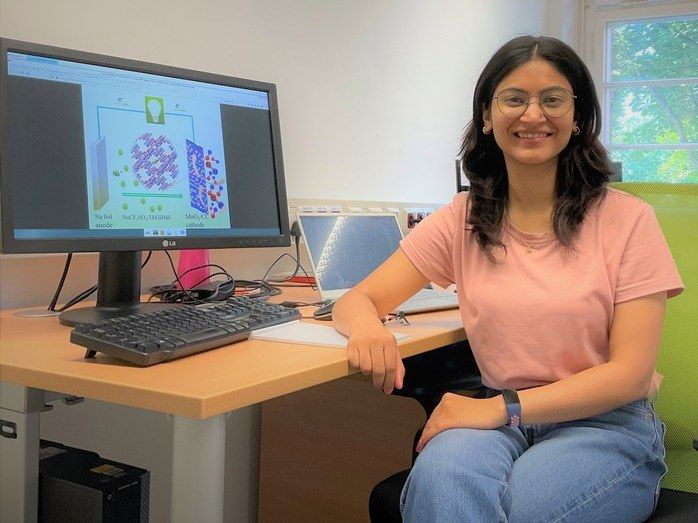Humboldt-fellow Dr. Preeti Bhauriyal: Designing conductive MOFs for long life Lithium-Sulfur batteries
Humboldt-fellow Dr. Preeti Bhauriyal from India works at the group of Theoretical Chemistry at TU Dresden in order to research metal and covalent organic frameworks (MOFs and COFs) for various applications. Her overall aim is to design conductive metal organic frameworks based cathode hosts for efficient, long-life Lithium-Sulfur batteries (Li–S batteries) as promising energy-storage systems of the future.

Humboldt-fellow Dr. Preeti Bhauriyal
© privat
Powerful, rechargeable, green batteries play a key role in the energy transition, for example as stationary intermediate energy storage units from renewable energy sources or in electric cars to displace fossil fuels. One of the promising candidates is called lithium-sulfur battery. However, there are a few technical challenges, e.g. the low conductivity of sulphur, its massive volume change upon discharging and finding a suitable cathode, that are impeding the broad commercialization of Li-S batteries.
Dr. Preeti Bhauriyal was involved in the computational modelling on clean energy materials for batteries, fuel cells and photocatalysis during her Ph.D. at the Indian Institute of Technology (IIT) Indore, India. In August this year, she started an Alexander von Humboldt-fellowship at the Chair of Theoretical Chemistry of Technische Universität Dresden headed by Prof. Thomas Heine. Her project “Conductive Metal Organic Frameworks (MOFs) Based Cathode Hosts for Lithium-Sulfur Batteries” focuses on the design of electrically conductive MOFs using precisely predictive calculations and evaluate their suitability as cathode hosts in Li-S batteries.
In working with Thomas Heine, Dr. Bhauriyal is optimistic in succeeding to design an ideal cathode host to improve the Coulombic efficiency, rate capability and lifespan of Lithium-Sulfur batteries: “Prof. Thomas Heine is an internationally recognized scientist in the field of computational nanotechnology, with significant contributions in physics, chemistry and materials sciences. The research expertise of Prof. Heine, which involves computational method development, designing and application of framework materials such as MOFs and COFs, two-dimensional materials and topological materials, is highly relevant to my proposed work. In his group, I have the opportunity to learn new computational techniques, methods development, and modelling of MOFs as well as I have opportunities to form collaboration networks involving leading local scientists within TU Dresden and the Dresden scientific landscape. The choice of TU Dresden was also supported by the high-performance computational resources provided by Center for Information Services and High Performance Computing (ZIH).”
Other news from the department science
Most read news
More news from our other portals
See the theme worlds for related content
Topic World Battery Technology
The topic world Battery Technology combines relevant knowledge in a unique way. Here you will find everything about suppliers and their products, webinars, white papers, catalogs and brochures.

Topic World Battery Technology
The topic world Battery Technology combines relevant knowledge in a unique way. Here you will find everything about suppliers and their products, webinars, white papers, catalogs and brochures.




























































